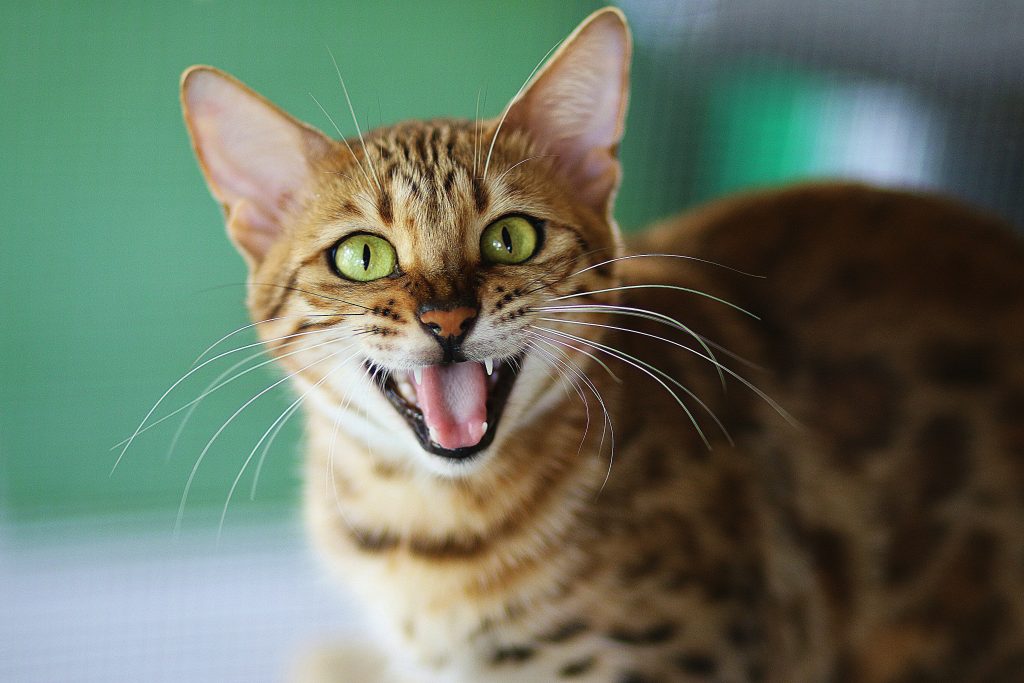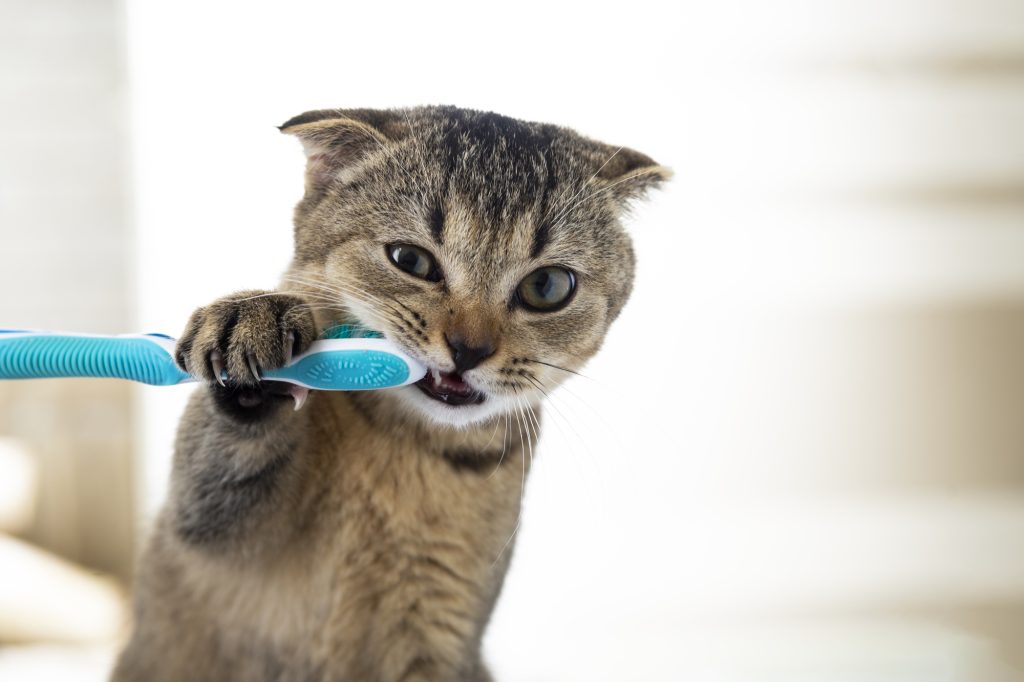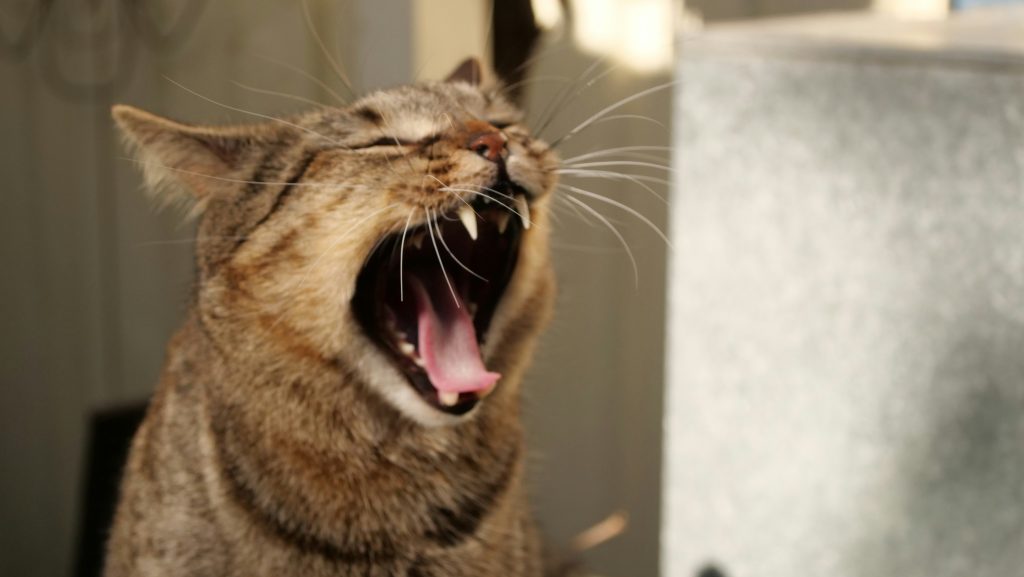Table of Contents
As a devoted cat owner, you might find yourself puzzled by the persistent bad breath in your cat. This isn’t just a trivial odor matter, it often signals underlying health issues that need attention. From dental disease to diet, multiple factors can contribute to this unpleasant situation. But don’t worry; understanding the causes can lead to practical solutions. So, if your cat eats well yet is experiencing bad breath, join us as we explore how to maintain your cat’s body health and freshen up their breath.
Unraveling the Mystery of Feline Halitosis
Bad breath in cats, or feline halitosis, is often a sign of dental disease. Neglect in oral hygiene can lead to plaque accumulation on the teeth and oral cavity, causing an offensive odor. While cats are notorious for their self-cleaning habits, they still need assistance maintaining a clean mouth to prevent such issues.
Addressing the root causes of halitosis is essential. Regular dental care at home and through professional services can prevent the build-up of harmful bacteria and plaque. Understanding the importance of oral hygiene in cats is the first step towards ensuring their long-term health and well-being.
1. The Main Culprits Behind Your Cat’s Smelly Breath
Periodontal disease and oral trauma are among the leading causes of bad breath in cats. If not addressed, these conditions can cause significant discomfort and health issues. It’s important to regularly check your cat’s mouth for any signs of disease or injury that could be causing unpleasant breath.
• Dental Problems and Gum Disease
Oral hygiene is crucial in preventing dental problems and gum disease in cats. Bacteria in the mouth can also travel to other parts of the cat’s body, leading to more severe health complications. Regular brushing and dental care can help keep these bacteria at bay.
Ensuring your cat’s mouth is clean is not just about fresh breath; it’s also about their overall health. Neglecting oral care can result in your cat suffering from painful and potentially serious dental issues. Hence, proper dental hygiene practices are essential for every cat owner to adopt.
• Diet and Digestive Issues
The type of cat food you provide plays a significant role in your cat’s dental health. For instance, some believe that dry food can help scrape plaque off the teeth, although this is not a substitute for brushing. A balanced diet also supports digestive health, which can influence the freshness of your cat’s breath.
Conversely, a poor diet can contribute to digestive issues that may lead to bad breath. It’s important to choose high-quality cat food that meets all your cat’s nutritional needs and seek veterinary advice if you suspect your cat’s diet is affecting its breath.
2. Additional Health Concerns Linked to Bad Cat Breath
While dental care is fundamental, an evil cat’s breath may indicate other health concerns. It is advisable to have your cat get a dental checkup multiple times a week to remove hard-to-reach plaque and tartar. Such proactive measures can catch any underlying health problem before it manifests as bad breath or other symptoms.
• Kidney Disease and Its Oral Manifestations
Bad breath can sometimes indicate more severe conditions such as kidney disease. Feline stomatitis, for instance, is an oral disease that causes severe inflammation of the gums and is sometimes associated with kidney issues. An accurate diagnosis is crucial for proper treatment and management.
If your cat’s breath has a strong ammonia-like odor, it could be a symptom of kidney disease. This is why regular veterinary check-ups are essential for early detection and intervention, ensuring your feline companion’s best possible health outcomes.
• Diabetes Mellitus and Associated Oral Symptoms
Diabetes Mellitus in cats is another condition that can lead to unusual breath odors. The disease can alter the smell of a cat’s breath due to changes in metabolism. Monitoring for sweet or fruity breath symptoms can help identify diabetes early on.
Proper diabetes management includes regular veterinary care and may involve adjustments to your cat’s diet and lifestyle. Early detection and treatment are crucial to controlling diabetes and preventing associated oral symptoms that can affect your cat’s breath.

Proactive Measures for Combating Feline Bad Breath
Ensuring your cat’s breath remains fresh involves more than just reacting to foul odors. Proactive measures, such as establishing a consistent oral hygiene routine and seeking regular veterinary care, can help prevent the onset of dental issues and contribute to overall health.
At-Home Dental Care Strategies
At-home dental care is a cornerstone of maintaining your cat’s dental health. Integrating teeth brushing into your cat’s routine can significantly reduce the risk of dental disease and the subsequent bad breath it can cause.
Regular Brushing Techniques
Brushing your cat’s teeth may seem daunting, but with patience and practice, it can become a stress-free part of your routine. Using a cat-specific toothbrush and toothpaste, gently brush a few teeth and gradually increase as your cat becomes more comfortable.
Consistency is key. Aim to brush your cat’s teeth daily, or at least several times a week, to prevent plaque and tartar build-up. Regular brushing can significantly improve your cat’s oral hygiene and reduce the chances of bad breath.
Dental Treats and Water Additives
In addition to brushing, dental treats, and water additives can play a role in maintaining your cat’s dental health. Feeding your cat dental treats is an easy way to help scrub their teeth as they chew. Look for products that are scientifically proven to reduce tartar and plaque.
Water additives are another tool in the dental hygiene arsenal. These products can be added to your cat’s water bowl to help reduce bacteria and freshen your breath. Always choose additives that are safe and formulated specifically for cats.
Professional Solutions and Vet Visits
Regular veterinary check-ups are essential for maintaining your cat’s oral health. Professional cleanings and exams can catch problems home care might miss, ensuring your cat’s mouth remains healthy.
When to Visit Vets Today to Book an Examination
If you notice persistent bad breath or changes in your cat’s oral health, it’s time to visit the vet. Scheduling a dental examination can accurately assess your cat’s needs and help prevent more serious issues from developing.
If you’re concerned about your cat’s breath, take it to the vet for an annual check-up. Early detection and treatment are crucial for maintaining dental health and overall well-being.
Professional Cleaning and Dental Procedures
Professional dental cleanings are an integral part of your cat’s oral care. These cleanings go beyond what can be achieved at home, removing bacteria from the teeth and mouth that can also travel to other body parts.
Occasionally, your cat may require more extensive dental procedures to address specific issues. Trust your vet to perform these procedures with care and expertise, making your cat enjoy a healthier mouth and fresher breath.

Understanding and Preventing Feline Oral Health Issues
Maintaining your cat’s oral hygiene is crucial for its overall well-being. Just like humans, cats can suffer from a variety of dental issues that can result in discomfort, pain, and even more serious health complications if left untreated. Prevention is key, and understanding the role of regular oral care will significantly reduce the risk of such problems.
By incorporating teeth cleaning into your cat’s daily routine and being mindful of their diet, you can help ensure their mouth remains healthy. A proactive approach to oral care can prevent the need for more invasive treatments down the line and contribute to a longer, happier life for your feline friend.
The Importance of Oral Hygiene in Cats
Good oral hygiene is essential to prevent the buildup of plaque and tartar, which can lead to periodontal disease—a common cause of bad breath in cats. Regular brushing and using products designed for feline dental care can significantly decrease the chance of such dental issues developing. It’s not just about fresh breath; it’s about keeping your cat healthy and pain-free.
Recognizing the Signs of Dental Disease Early
Being vigilant about your cat’s oral health means watching for signs of dental disease. Redness or bleeding in the teeth and gums, difficulty eating, and a noticeable behavior change, like decreased playfulness, can all indicate oral discomfort. Early detection is crucial, so these symptoms should prompt a visit to the vet for a thorough dental checkup.
Integrating Oral Care Into Your Cat’s Routine
Integrating dental care into your cat’s daily routine doesn’t have to be a struggle. Starting slow and being consistent with oral hygiene practices can help your cat become accustomed to the process. Brushing your cat’s teeth regularly helps prevent plaque and tartar buildup, which can lead to serious dental diseases.
Alongside brushing, other products such as dental treats and water additives can assist in maintaining your cat’s oral health. These products are formulated to reduce plaque and freshen your cat’s breath, complementing the brushing routine and making oral care a seamless part of their daily life.
Tips and Tricks for Painless Oral Care at Home
Patience and positive reinforcement go a long way when it comes to at-home oral care. Begin by slowly introducing your cat to the taste of pet-friendly toothpaste, progressing to gentle brushing motions with a finger brush or soft-bristled toothbrush designed for cats. Rewarding your cat after each brushing session can make the experience more enjoyable and establish a positive association.
Choosing the Right Products for Your Feline Friend’s Oral Health
Proper dental care products are vital for your cat’s oral health. Look for toothbrushes with soft bristles, toothpaste formulated specifically for cats, and vet-recommended dental treats. These products are designed to be safe and effective for cats, helping to maintain good oral hygiene without causing discomfort or harm.

Maintaining a Healthy Diet for Optimal Oral Health
A healthy diet plays a significant role in maintaining your cat’s oral health. Foods that are high in sugar or carbohydrates can contribute to the buildup of plaque and tartar. Conversely, specific diets promote dental health by mechanically cleaning the teeth as your cat chews. Proper nutrition can be a simple yet effective way to combat bad breath and dental issues.
Regular veterinary check-ups that include an oral health assessment are also essential to a preventative care routine. A professional can spot early signs of dental disease and provide guidance on the best dietary choices for your cat’s specific needs, ensuring that your cat’s mouth stays as healthy as its body.
The Role of Nutrition in Preventing Bad Breath
Nutrition is a cornerstone of feline oral health. A balanced diet not only supports overall well-being but also aids in maintaining dental hygiene. Brushing should happen multiple times a week to control tartar and to help spot potential issues like tooth resorption. Foods rich in essential nutrients can reinforce dental health, and sometimes, a cat under anesthesia may be necessary for a thorough dental examination.
Foods to Avoid and What to Include in Your Cat’s Diet
Remember that not all cat food is created equal when constructing your cat’s diet. If your cat has bad breath, it could be a sign that they are eating smelly or poor-quality food. To link food to dental health, choose dry kibble that helps scrape away plaque as they chew or specialized dental diets recommended by veterinarians. Avoid sugary treats and human food, as these can exacerbate dental problems.
Wrapping up the Whiff: Ensuring Your Cat’s Breath Is Fresh
Combatting your cat’s bad breath may be as simple as making a few tweaks in their daily care. A key step is ensuring they aren’t eating smelly foods that can contribute to the odor. Regularly cleaning your cat’s teeth with a suitable cat toothbrush can also make a significant difference.
When considering treatment for your cat, remember that prevention is always better than cure. A proper diet, consistent oral hygiene, and routine veterinary checks can keep bad breath at bay. By integrating these habits into your cat’s lifestyle, you can ensure that their breath remains fresh and they stay happy and healthy. Wrapping up, remember that your vigilance with these simple steps is the best defense against your cat’s bad breath.

Hi, I’m Zoey, a devoted mom to two charming Siamese cats. My passion lies in assisting fellow pet owners in providing optimal care for their cats. On CatsEuphoria, I share practical tips and relatable stories, inviting you to join me in appreciating the authentic bond between humans and our beloved feline companions.




